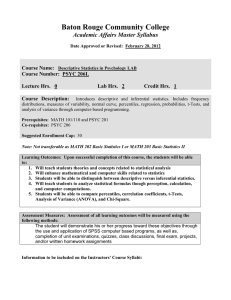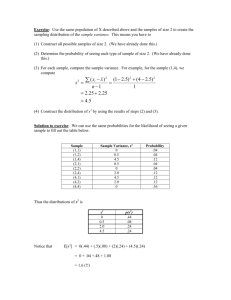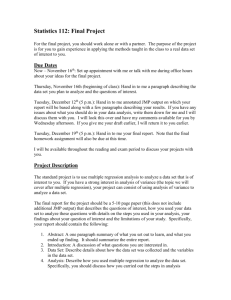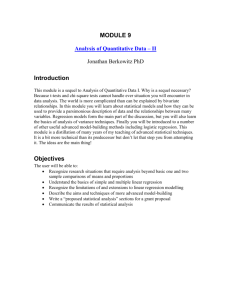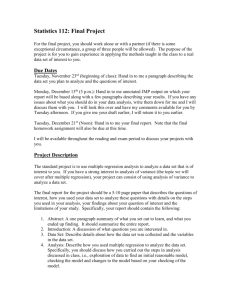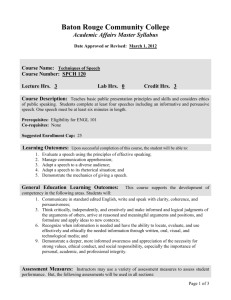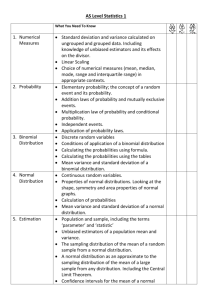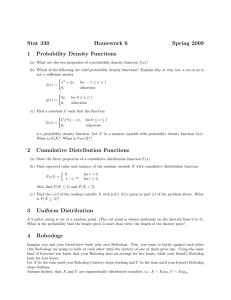PSYC 206 - Baton Rouge Community College
advertisement
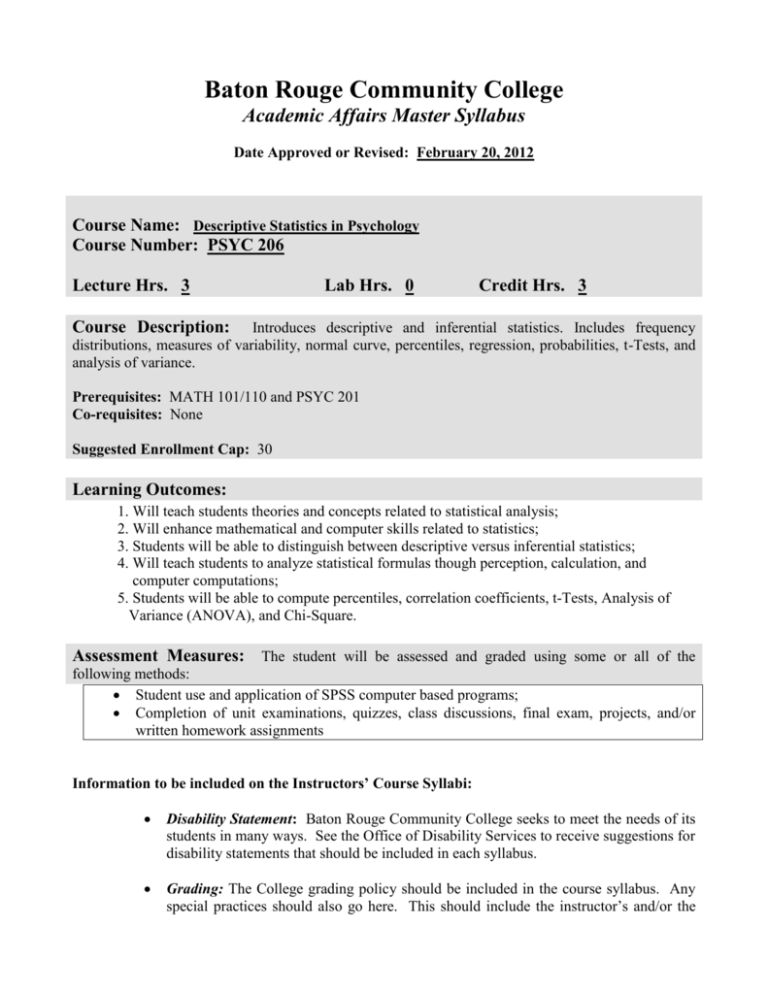
Baton Rouge Community College Academic Affairs Master Syllabus Date Approved or Revised: February 20, 2012 Course Name: Descriptive Statistics in Psychology Course Number: PSYC 206 Lecture Hrs. 3 Lab Hrs. 0 Credit Hrs. 3 Course Description: Introduces descriptive and inferential statistics. Includes frequency distributions, measures of variability, normal curve, percentiles, regression, probabilities, t-Tests, and analysis of variance. Prerequisites: MATH 101/110 and PSYC 201 Co-requisites: None Suggested Enrollment Cap: 30 Learning Outcomes: 1. Will teach students theories and concepts related to statistical analysis; 2. Will enhance mathematical and computer skills related to statistics; 3. Students will be able to distinguish between descriptive versus inferential statistics; 4. Will teach students to analyze statistical formulas though perception, calculation, and computer computations; 5. Students will be able to compute percentiles, correlation coefficients, t-Tests, Analysis of Variance (ANOVA), and Chi-Square. Assessment Measures: The student will be assessed and graded using some or all of the following methods: Student use and application of SPSS computer based programs; Completion of unit examinations, quizzes, class discussions, final exam, projects, and/or written homework assignments Information to be included on the Instructors’ Course Syllabi: Disability Statement: Baton Rouge Community College seeks to meet the needs of its students in many ways. See the Office of Disability Services to receive suggestions for disability statements that should be included in each syllabus. Grading: The College grading policy should be included in the course syllabus. Any special practices should also go here. This should include the instructor’s and/or the department’s policy for make-up work. For example in a speech course, “Speeches not given on due date will receive no grade higher than a sixty” or “Make-up work will not be accepted after the last day of class.” Attendance Policy: Include the overall attendance policy of the college. Instructors may want to add additional information in individual syllabi to meet the needs of their courses. General Policies: Instructors’ policy on the use of things such as beepers and cell phones and/or hand held programmable calculators should be covered in this section. Cheating and Plagiarism: This must be included in all syllabi and should include the penalties for incidents in a given class. Students should have a clear idea of what constitutes cheating in a given course. Safety Concerns: In some programs this may be a major issue. For example, “No student will be allowed in the safety lab without safety glasses.” General statements such as, “Items that may be harmful to one’s self or others should not be brought to class.” Library/ Learning Resources: Since the development of the total person is part of our mission, assignments in the library and/or the Learning Resources Center should be included to assist students in enhancing skills and in using resources. Students should be encouraged to use the library for reading enjoyment as part of lifelong learning. Expanded Course Outline: Week 1: Introduction to Statistics (topics include: hypothesis, variables, and scales of measurement) Week 2: Frequency Distribution (topics include: ranked and frequency distributions, apparent and real limits, and relative and cumulative relative frequency) Week 3: Graphs (topics include: frequency histogram, frequency polygon, relative and cumulative frequency polygon, cumulative relative frequency polygon, cumulative percent polygon, and stem-and-leaf diagrams) Week 4: Measures of Central Tendency (topics include: mean, mode, median, frequency distributions and box-plots) Week 5: Measures of Variability (topics include: range, mean deviation, variance, and standard deviation) Week 6: Scales Scores and Standard Scores (topics include: adding and subtracting of constants and Week 7: The Normal Curve (topics include: normal curve, proportions vs. percentage, and percentile) Week 8: Correlation (topics include: correlation coefficient and covariance) Week 9: Regression (topics include: predictions vs. linear regression, z-scores, regression line and standard error of estimates) Week 10: Probability Theory and Sampling (topics include: probabilities and sampling, standard error of the mean, The Central Limit Theorem, and 1-Test) Week 11: Experimental Design (topics include: development of hypotheses, identifying variables, factors in experimental design, and statistical significance) Week 12: t-test (topics include: single sample t tests, t tests between two independent sample means, t tests for correlated samples and power and t tests) Week 13: One-way Analysis of Variance (topics include: hypothesis testing, computation of mean square between and within groups, and F test) Week 14: Two-Way Analysis of Variance (topics include: main effects, interaction, computations of sums of squares, computations of degrees of freedom, computation of mean squares, computation of F Ratios, significance of main effects and significance of interaction) Week 15: Chi-Square and Other Nonparametric Statistics (topics include: The Mann-Whitney U Test, The Wilcoxin T Test, and The Kruskal-Wallis Test)
